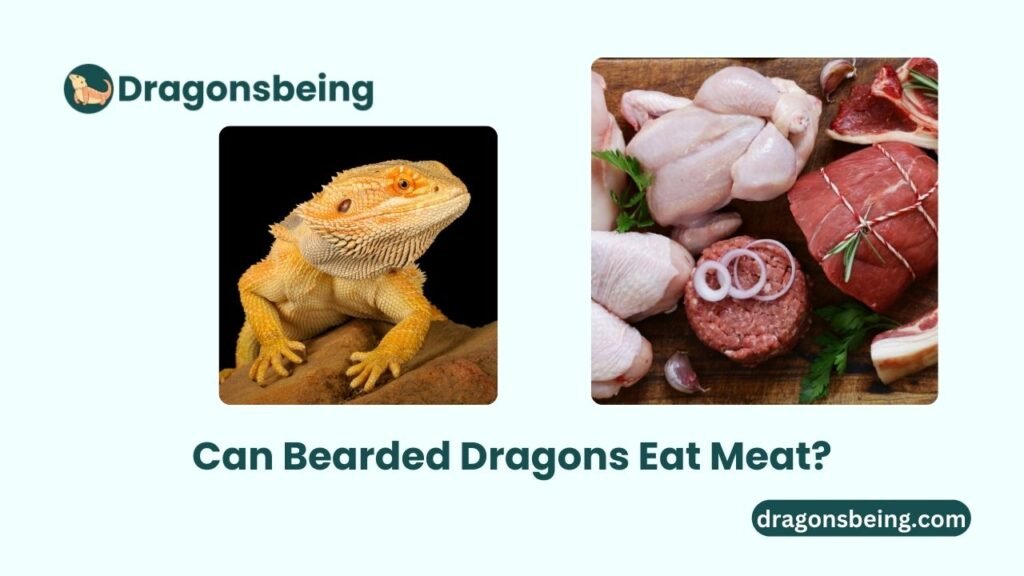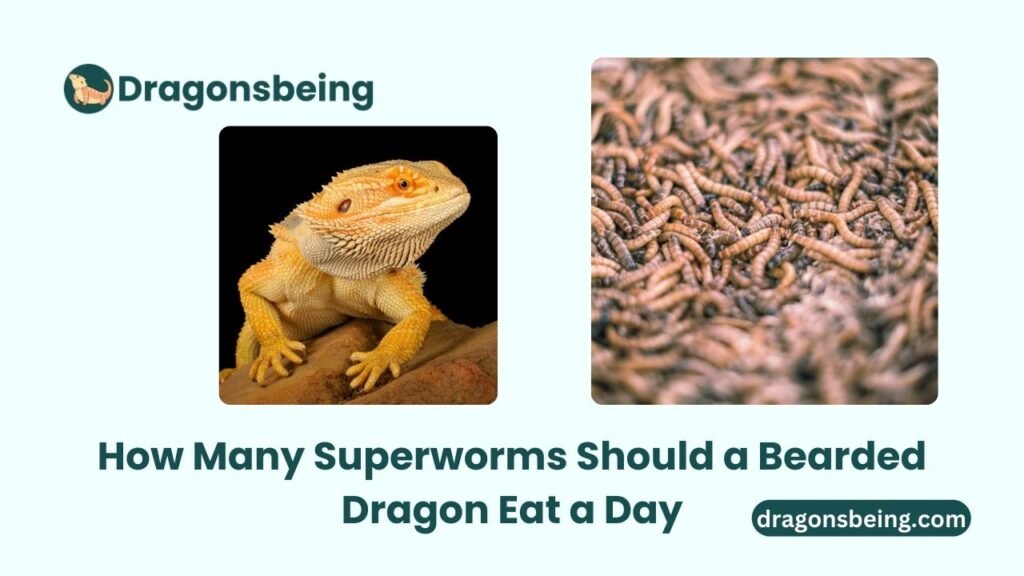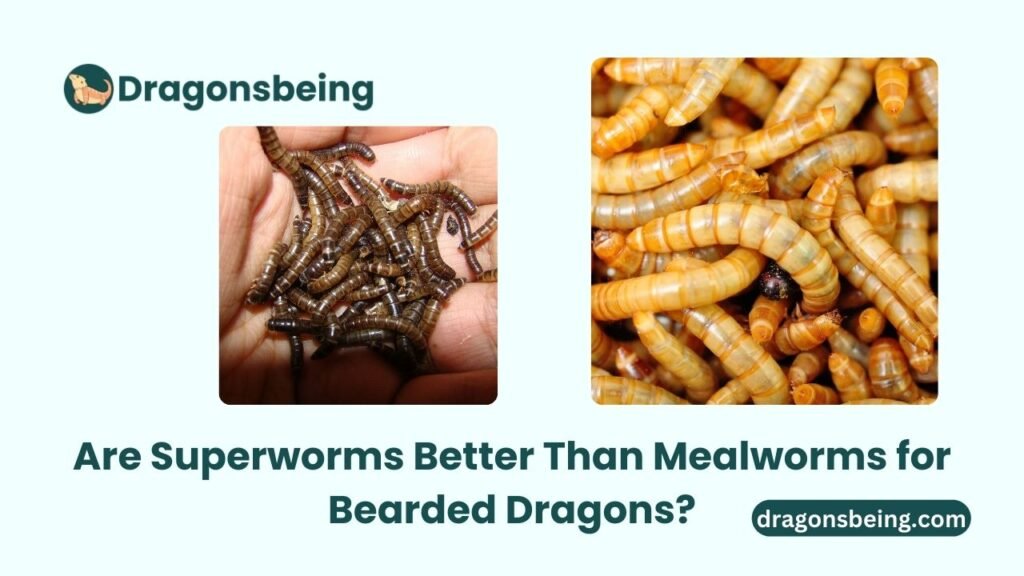Bearded dragons can eat meat, but it should only be a small part of their diet. A diet primarily consisting of vegetables and insects is healthier for them.
Bearded dragons are popular pets known for their unique personalities and care requirements. Understanding their dietary needs is essential for their health.
These reptiles are omnivorous, meaning they eat both plant and animal matter. While they can consume meat, it should not dominate their meals.
A balanced diet includes a variety of vegetables, fruits, and insects. Overfeeding meat can lead to health issues like obesity and digestive problems.
Always ensure that any meat offered is fresh and appropriately sized to prevent choking. Proper nutrition is key to a happy, healthy bearded dragon.
Nutritional Needs Of Bearded Dragons

Bearded dragons have specific nutritional needs. Their diet affects their health and growth. Understanding these needs is essential for proper care.
Protein Requirements
Protein is vital for the health of bearded dragons. Young dragons need more protein than adults. Here’s a quick look at their protein needs:
| Age Group | Protein Percentage |
|---|---|
| Hatchlings (0-3 months) | 30-50% |
| Juveniles (3-12 months) | 20-30% |
| Adults (12+ months) | 10-20% |
High-protein foods include:
- Crickets
- Mealworms
- Super worms
Limit protein sources for adult dragons. Too much can cause health issues.
Vitamins And Minerals Essentials
Bearded dragons need vitamins and minerals for overall health. Calcium is crucial for bone health.
- Calcium: Prevents metabolic bone disease.
- Vitamin D3: Helps absorb calcium.
- Vitamin A: Supports vision and immune function.
Offer a variety of leafy greens. Good options include:
- Collard greens
- Dandelion greens
- Mustard greens
Supplement their diet with calcium and vitamin D3. This ensures they receive necessary nutrients.
The Role Of Meat In Their Diet
Bearded dragons are omnivores. They eat both plants and animals. Meat plays a key role in their diet. It provides essential nutrients and proteins. These nutrients support growth and energy.
Types Of Meat They Can Consume
Bearded dragons can eat various types of meat. Here’s a list of acceptable options:
- Crickets
- Mealworms
- Waxworms
- Small pieces of chicken
- Lean beef
- Fish (like salmon and trout)
Always ensure the meat is fresh. Avoid processed meats. They may contain harmful additives.
Risks Associated With Meat
Feeding meat to bearded dragons has some risks. Here are a few important points:
| Risk | Description |
|---|---|
| Obesity | Too much meat can lead to obesity. |
| Digestive Issues | High protein can cause digestive problems. |
| Unbalanced Diet | Meat should not replace vegetables and fruits. |
| Bacterial Infection | Raw meat may contain harmful bacteria. |
Monitor portion sizes. Maintain a balanced diet with vegetables and fruits. Always consult a vet for guidance.
Appropriate Meat Choices
Choosing the right meat for your bearded dragon is important. Not all meats are safe. Understanding which meats are suitable helps keep your pet healthy.
Safe Meats For Bearded Dragons
Some meats can be beneficial for bearded dragons. Here are some safe options:
- Crickets: High in protein and easy to digest.
- Mealworms: Good source of fat and protein.
- Silkworms: Packed with nutrients and soft texture.
- Grasshoppers: High in protein and low in fat.
- Lean chicken: Cooked and shredded, very nutritious.
Meats To Avoid
Not all meats are safe for bearded dragons. Avoid these:
| Meat Type | Reason to Avoid |
|---|---|
| Processed meats | High in salt and preservatives. |
| Fatty meats | Can cause obesity and health issues. |
| Raw meats | Risk of bacteria and parasites. |
| Red meats | Difficult to digest and too rich. |
| Fish | High in mercury and not nutritious. |
Always choose meats carefully. Consult a vet for the best advice.
Feeding Frequency And Portion Control
Feeding Bearded Dragons meat requires careful planning. Proper frequency and portion control help maintain their health. Too much meat can cause health issues. Balance is key for a happy, healthy pet.
How Often To Feed Meat
Bearded Dragons enjoy a varied diet. Meat should not be their main food. Here’s a simple guide:
- Juveniles (under 6 months): Feed meat 2-3 times a week.
- Adults (over 6 months): Feed meat 1-2 times a week.
Always watch your dragon’s reaction to meat. Adjust frequency based on their health and activity level.
Recommended Serving Sizes
Portion control is vital for Bearded Dragons. Here are recommended serving sizes:
| Age Group | Meat Serving Size |
|---|---|
| Juveniles | 1-2 small pieces (size of their eye) |
| Adults | 2-3 small pieces (size of their eye) |
Adjust portions based on your dragon’s size and health. Always remove uneaten meat after a few hours.
Preparation Of Meat For Bearded Dragons
Preparing meat for your bearded dragon is essential for their health. Proper preparation ensures they receive the nutrients they need. Understanding how to prepare meat safely is crucial.
Cooking Vs. Raw
Both cooked and raw meat can be safe for bearded dragons. However, each has its own benefits:
| Type of Meat | Benefits | Considerations |
|---|---|---|
| Cooked |
|
|
| Raw |
|
|
Chopping And Serving Techniques
Proper chopping and serving enhance your bearded dragon’s eating experience. Follow these steps for safe preparation:
- Choose lean meats like chicken or turkey.
- Wash hands and surfaces before handling meat.
- Cut meat into small, bite-sized pieces.
- Avoid bones as they can cause choking.
- Serve fresh meat to prevent spoilage.
Monitor your bearded dragon while eating. Ensure they chew their food well. Remove any uneaten meat after 30 minutes to prevent bacteria growth.
Alternatives To Meat
Bearded dragons can thrive without meat. They need a balanced diet. Plant-based proteins and commercial foods are great options. Let’s explore these alternatives.
Plant-based Protein Sources
Many plants offer essential proteins. Here are some excellent choices:
- Collard Greens: High in calcium and fiber.
- Kale: Packed with vitamins A and C.
- Dandelion Greens: Rich in nutrients.
- Mustard Greens: Good for digestion.
- Squash: Contains vitamins and minerals.
Mix these greens in their diet. Always chop them into small pieces. This makes it easier for your bearded dragon to eat.
Commercial Bearded Dragon Food Options
Many brands offer commercial foods. These are specially designed for bearded dragons. Here’s a quick comparison of popular options:
| Brand | Type | Main Ingredients | Benefits |
|---|---|---|---|
| Rep-Cal | Pellets | Vegetables, vitamins | Complete nutrition |
| Zilla | Sticks | Insects, greens | High protein |
| Exo Terra | Freeze-Dried | Insects, fruits | Convenient storage |
Read labels carefully. Choose options with high-quality ingredients. Balance these foods with fresh vegetables.
Recognizing And Managing Health Issues
Bearded dragons can have health issues from poor diets. Recognizing these problems early is crucial. Managing their diet helps prevent serious health risks.
Signs Of Dietary Imbalances
Watch for these common signs of dietary imbalances:
- Weight loss: Noticeable decrease in body weight.
- Lethargy: Reduced energy and activity levels.
- Abnormal stool: Changes in color or consistency.
- Skin issues: Dry or flaky skin.
- Appetite changes: Loss of interest in food.
Each symptom can indicate a dietary problem. Address these issues quickly to ensure your bearded dragon’s health.
When To Consult A Vet
Seek veterinary help if you notice:
- Persistent weight loss despite a good diet.
- Severe lethargy lasting more than a few days.
- Consistent abnormal stool for over a week.
- Sudden skin problems or shedding issues.
- Refusal to eat for more than 48 hours.
Consulting a vet ensures proper treatment. Regular check-ups can prevent many health issues.
Best Practices For A Balanced Diet
A balanced diet is key for your bearded dragon’s health. These reptiles need a mix of vegetables, fruits, and protein sources. A proper diet keeps them active and happy.
Creating A Varied Meal Plan
Variety is essential. Different foods provide different nutrients. Here’s a simple meal plan:
| Day | Protein Source | Vegetables | Fruits |
|---|---|---|---|
| Monday | Crickets | Collard Greens | Blueberries |
| Tuesday | Mealworms | Carrots | Strawberries |
| Wednesday | Waxworms | Squash | Mango |
| Thursday | Superworms | Bell Peppers | Apples |
| Friday | Grasshoppers | Kale | Peaches |
| Saturday | Pinkies (baby mice) | Mustard Greens | Bananas |
| Sunday | No protein | Mixed Veggies | Watermelon |
Mixing up proteins helps with nutrition. Always chop vegetables into small pieces. This makes it easier for your dragon to eat.
Supplementation And Hydration
Vitamins and minerals are vital. Use a calcium supplement to prevent bone issues. Dust food with calcium powder a few times a week.
- Vitamin D3 is important for calcium absorption.
- Multivitamin supplements can also be helpful.
- Provide fresh, clean water daily.
- Use a shallow dish to prevent drowning.
Hydration is crucial. Bearded dragons can absorb moisture from their food. Mist their enclosure lightly to boost humidity.
Frequently Asked Questions
Can Bearded Dragons Eat Raw Meat?
Bearded dragons can eat raw meat occasionally, but it should be lean and served in small portions.
Is Cooked Meat Safe For Bearded Dragons?
Cooked meat is generally safe but should be unseasoned and offered in moderation to avoid health issues.
What Types Of Meat Can Bearded Dragons Eat?
Bearded dragons can eat lean meats like chicken, turkey, and certain insects as part of a balanced diet.
How Often Can Bearded Dragons Eat Meat?
Meat should be a rare treat, given once or twice a month, to maintain a balanced diet.
Can Bearded Dragons Eat Fish?
Fish is not recommended for bearded dragons due to high-fat content and potential toxins.
What Happens If Bearded Dragons Eat Too Much Meat?
Overfeeding meat can lead to obesity, digestive problems, and nutritional imbalances in bearded dragons. “`
Conclusion
Bearded dragons can eat meat, but it should be given in moderation. A balanced diet is crucial for their health. Focus on offering a variety of insects and vegetables. Always ensure the meat is safe and appropriately prepared. With the right care, your bearded dragon can thrive and enjoy a diverse menu.

Hi, I’m Dr. Michelle Mayers, a veterinary professional with a deep passion for animal health and well-being. Over the years, I’ve dedicated my life to caring for animals and helping pet owners better understand their furry, feathered, or scaly companions. On my blog, Dragonsbeing, I share insights, tips, and stories that aim to educate, inspire, and connect with fellow animal lovers. Join me at Dragonsbeing as we explore the fascinating world of veterinary care and celebrate the special bond between humans and animals!


